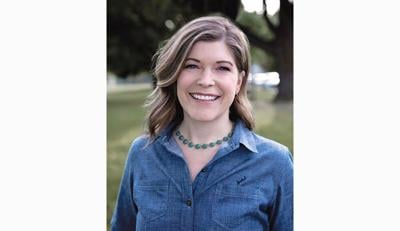By Nathan Wilson
Columbia Gorge News
WHITE SALMON — Mayor Marla Keethler further clarified the city’s progress and stance on its Bluff Connector Trail project, and Finance Director Jennifer Neil unpacked municipal revenue streams in preparation for upcoming budget deliberations during the Nov. 5 meeting of White Salmon’s City Council.
“This is a low-priority project,” Keethler said of the bluff trail. “This project moves forward when money is activated — money that’s not the city’s funds — which has been the reason why it’s been in conversation for much longer than it’s been active.”
As previously reported by Columbia Gorge News, the city held its final open house for the bluff trail, a series of stairs, platforms and walkways intended to link Jewett Boulevard with State Route 14, about three weeks ago after hosting several events to hear public feedback last fall and winter. Following the open house, however, Keethler heard concerns from residents who thought the city should be more focused on fundamental needs, like street repairs, so she stressed that any money going toward the bluff trail will come from grants — and that it won’t interfere with other construction or infrastructure projects.
With $1 million already obtained and a finished feasibility study, the first planning phase is officially over. While the city’s hoping to break ground using those dollars, Keethler acknowledged the second phase won’t see the project completed. But again, she reiterated, starting construction soon ensures that the trail can eventually merge with the new Hood River-White Salmon Bridge, including the planned roundabout along SR 14, and accommodate pedestrian traffic expected from the bridge.
There’s a larger package at play as well. Back in 2017 and early 2018, city staff and the National Park Service’s Rivers, Trails and Conservation Assistance Program developed a conceptual plan for a riverfront park on 12 acres of county-owned land, which is cut in half by the existing bridge. Although access is challenging, Keethler said those conversations are merely on hold, and the park is more feasible if the replacement bridge is moved slightly to the west, as has been suggested.
“By keeping [the bluff trail] project moving forward, it’s going to allow us to bring back the riverfront park, which has been raised and has awareness with the bridge authority,” said Keethler. “We do feel pretty confident that, as this moves forward, [we can] more securely bundle these things together and realize an entire north shore buildout.”
Of note, the city would rely on grant funding and nonprofit support to build the riverfront park, according to the conceptual plan.
Setting the stage for soon-to-be-had budget talks, Neil later explained White Salmon’s different sources of revenue, along with key trends and determining factors, that undergird its general fund. Overall, she concluded that revenues are “stable but constrained,” arguing that council should approve a 1% property tax increase.
Interest earned on investments is a bright spot for the city, according to Neil, projected to earn $189,000 in 2026 across all funds. Sales tax revenue also remains healthy, expected to produce $696,000 next year. Recently passed by county commissioners, the 0.1% criminal justice sales tax should generate an additional $40,000 for White Salmon next year, but Neil said she’s budgeting for a lesser amount since businesses have different reporting cycles. Those funds must go to services like law enforcement and corrections.
In somewhat of a surprise, the city’s lodging tax revenue declined in 2025 compared to the year prior, largely because of a dip in short-term rental activity. The city issued 15 fewer permits this year, Neil said, and tourism is trending toward longer-term stays. As for property tax, which is the city’s most stable source of money, it’s not keeping up with fixed costs.
“By taking that 1%, the city maintains its long-term revenue capacity instead of falling behind future inflation,” Neil said. “This is not a tax hike. It’s a maintenance action that helps maintain our poor revenue base.”
Even with the increase, the amount White Salmon would collect per $1,000 of assessed value still falls, and Neil pointed out that medical insurance costs are rising by 8.7% comparatively, along with other baseline expenditures. Council neglected to take action on the property tax increase, though, opting to make a decision at the next meeting on Nov. 19.
Councilors also discussed committee procedures, particularly whether public comment is acceptable in those meetings, and permitted the Bingen-White Salmon Police Department to accept a donated drone that will be used for public safety purposes in the consent agenda. Columbia Gorge News will cover both in a future edition.






















Commented
Sorry, there are no recent results for popular commented articles.